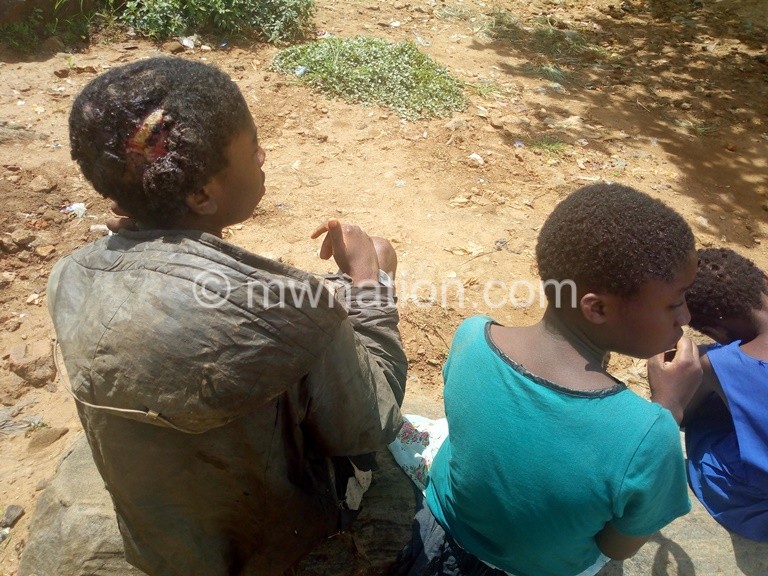Boy neglected, lives 6 years with open wound
As if the woes of orphanhood and living in a child-headed family were not enough, an epileptic boy at Malingamoyo in Blanytre City has been living with a wound on his head for six years.
The wound has not been treated for so long and now produces a stench that attracts flies wherever he goes.

On Monday, Francis Grevulo, 16, was found lying by the roadside in neighbouring Chimwankhunda Township following a seizure.
His condition has not only deprived him of education but also made him and his family be ostracised by society.
When we met him, he was wearing a hooded winter coat whose colour was difficult to tell because it was so dirty.
We traced the boy’s home yesterday, only to discover a family of four orphaned children rejected by their community, forcing his 14-year-old sister Thapelo to take on the role of mother of the house.
Our visit attracted prying eyes of not-so-concerned neighbours to the children’s dilapidated house whose windows are covered with cardboards while a piece of cloth covers the door way.
The children, who pay K10 000 monthly rentals for the house, say they take each day as it comes.
According to their aunt Tiyanjane Bamusi, whom we were able to trace after inquiring from the neighbours, the children lost their mother in 2011 and were being looked after by their grandmother who died in 2018.She did not say why she cannot look after them.
She said their uncle who lives in South Africa pays the rent but the money is not provided consistently.
Thapelo says life after their grandmother’s death has been a nightmare.
She said: “We rely on support from our brother who is aged 19 but does not live here with us. Sometimes our aunt brings us food, but most times we do not have food.
“For my sick brother and my nine-year-old sister, it is always a problem. I wish my brother got healed so we could all go to school. He suffers a lot also considering that he was withdrawn from school as other pupils were calling him names because of the smell that comes from the wound.”
A Chimwankhunda resident McDonald Mtetemela, who picked Francis from the street on Monday after he suffered a seizure, said the community had failed the children by not soliciting support for them.
He said: “From what I have seen, Francis can be treated at a health facility. In my view, the community is not being responsible enough—from neighbours, ward councillors, block and faith leaders all the way to the legislator of this area can help this boy even before we think of engaging the Social Welfare office.”
When contacted, a health expert Dr Olive Liwimbi said Francis’ illness was manageable.
She said: “Epilepsy is not a psychological condition, it’s neurological and it can be managed. What should happen is that the patient should be taken to a hospital and he will be put on long-term treatment.
“Most patients respond to medication which in some instances stops seizures or at least reduces their occurrence. If it is a question of stigma, that can be addressed by social services who can talk to teachers on how to approach the person.”
Concurring, another doctor, Professor Adamson Muula of the College of Medicine in Blantyre, said epilepsy can be managed with medication.
“The other things is supervision of epileptic children. If it is in the house, there can be modifications made such that if one falls or has a seizure while they are alone, the harm caused physically can be minimised,” he said.
Francis’s story mirrors the appalling state of the country’s social service system in which child-headed families are left to fend for themselves with no one to check on their welfare.
According to the 2015-2019 Malawi National Plan of Action (NPA), the country has over 1.8 million orphaned and vulnerable children (OVCs) representing 44.1 percent of 4.2 million children living in the lowest wealth bands.
Director of Child Affairs in the Ministry of Gender Children, Disability and Social Welfare McKnight Kalanda in a telephone interview yesterday acknowledged challenges in the provision of social support to OVCs nationwide, but said they have made progress in education support, among other areas.
A fact sheet compiled by the United States Agency for International Development (USAid) shows that 16.7 percent of children in Malawi are classified as OVCs and that one million OVCs have either lost one or both parents.
The United Nations Children and Education Fund (Unicef) statistics show that 20 percent of Malawian households were looking after OVCs with most of them headed by girls, women or the elderly.
Asked what needs to be done to improve the welfare of child-headed homes, Kalanda said government has put in place several measures to address the challenges.
“Whenever such cases as the one at Malingamoyo is noted, the community should report to the social welfare office in their district. But there are also frontline officers working in localities called community child protection workers who can be handy in such situations.”
He added that other inteventions were in the areas of shelter provisions to OVCs through the Malata Subsidy Programme.
The country currently has 800 CPWs who act as a link between community and social welfare system, 300 of whom are on the government payroll. Among the NPA objectives were to strengthen the survival, protection and development of 1 440 000 of the 1,8 million vulnerable children in Malawi by 2019.





